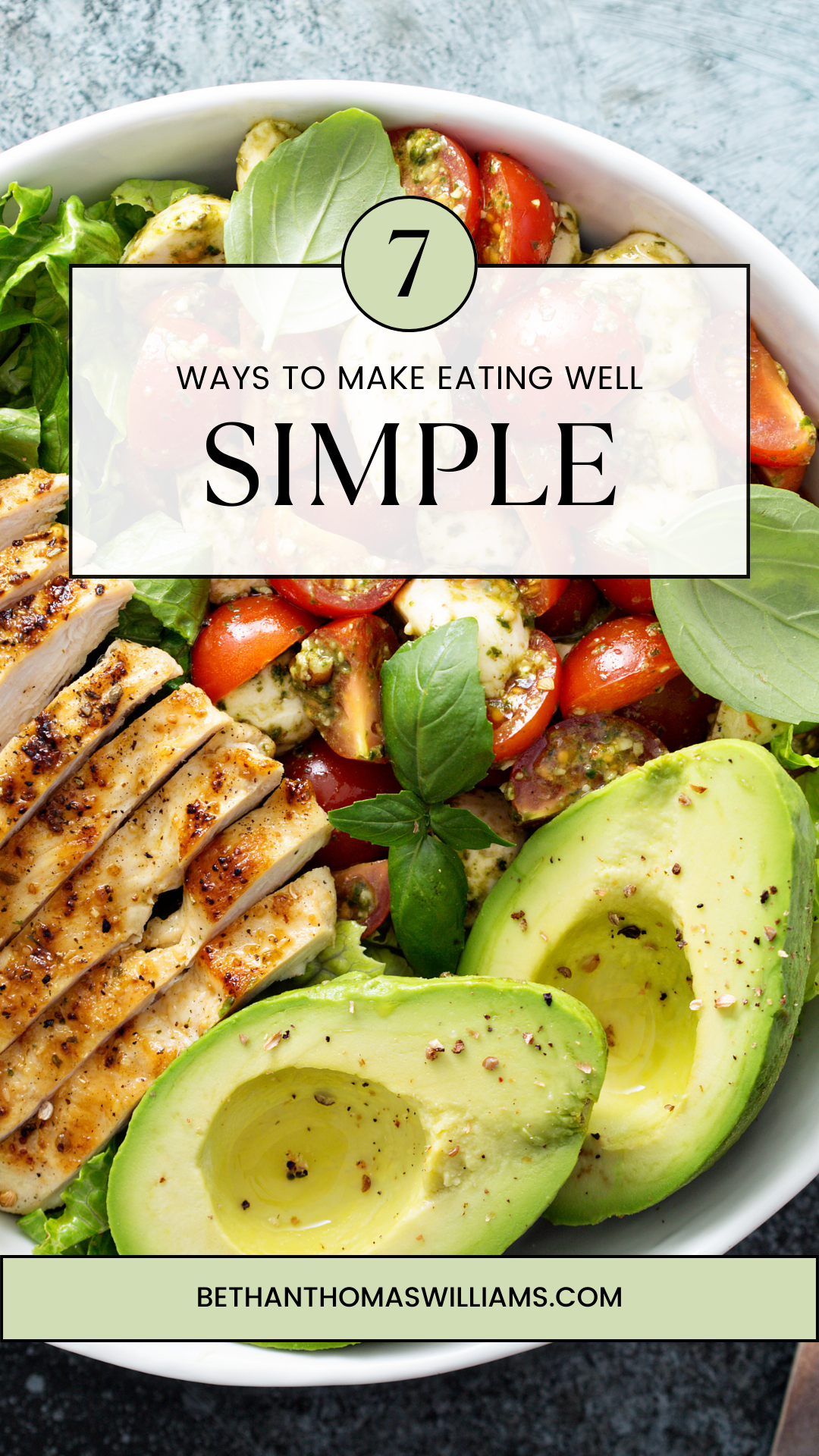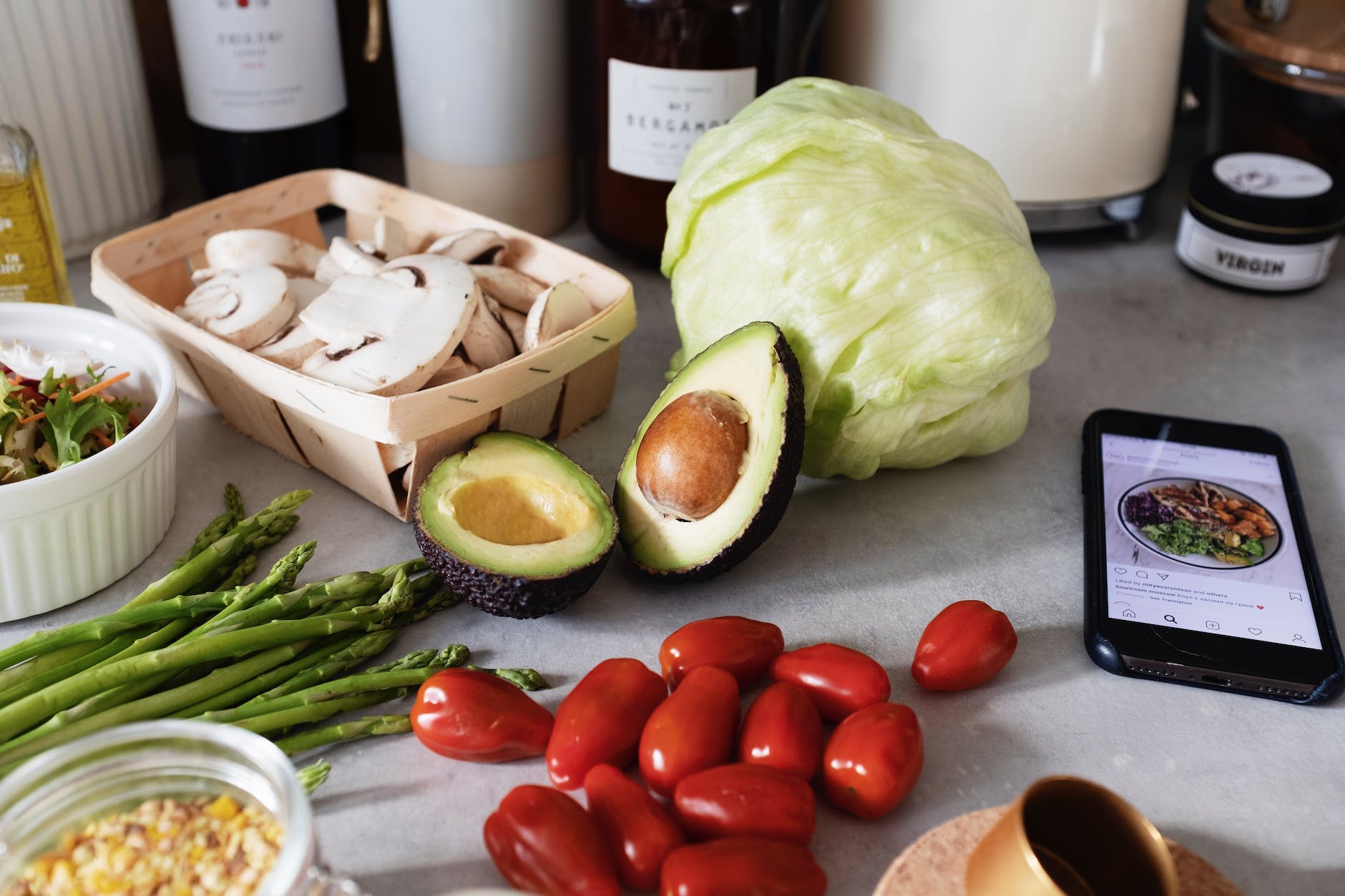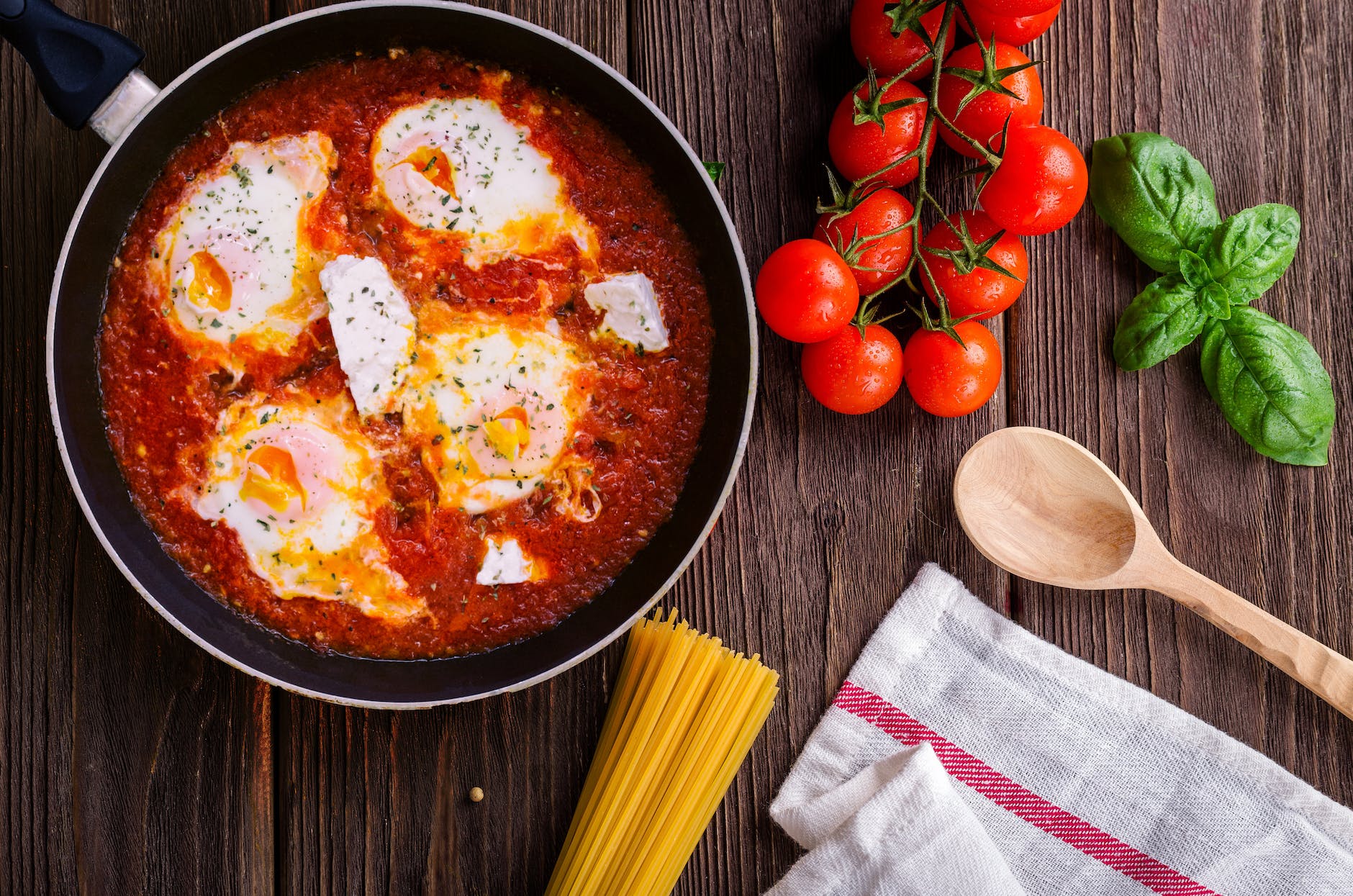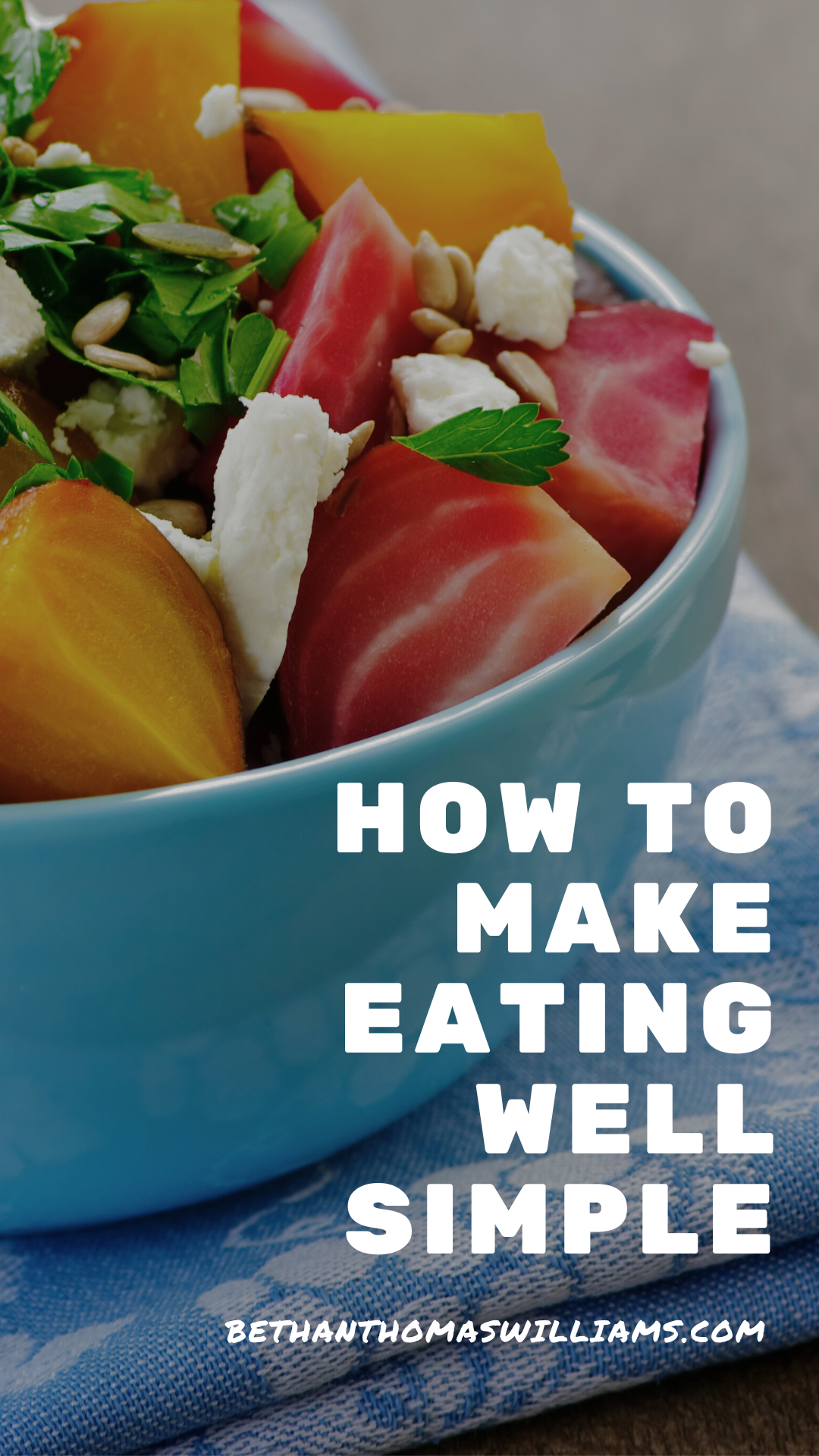Eating well shouldn’t be complicated.
I’ve written before about how we need to reframe taking care of ourselves, and instead of focusing on weight loss, make a shift into focusing on getting healthier instead. You can read that blog post here.
There is a lot of information out there about what you should eat, how you should eat, when you should eat and most of it has become contradictory and confusing. So let’s take it back to the basics.
The two things you need to be focusing on.
If you are not sure where to start – start with these two things – tuning into your hunger and fullness levels and eating a balanced plate.
They sound simple (and they are once you get the hang of them!) and not very exciting – but just focusing on these two things will make such a difference to your relationship with food and your body and makes knowing the what/when of eating simple and easy.
No more stressing over if you should or should not eating something.

Tuning into your hunger and fullness
As nice as it would be for it to be as easy as ‘eat when you are hungry and stop when you are full’, it is a bit more nuanced than that, and for some of us it can take us a little while to understand what signs our body gives us that we are hungry.
There are quite a few different signs of hunger, you might experience all of them, you may only experience one or two of them, but some of them are quite subtle and it may take a while to recognise those.
Signs might be:
- Fatigue
- Lack of energy
- Rumbling stomach
- Stomach pains
- Headache
- Shaky hands
- Brain fog
- Inability to focus
- Irritable
- ‘Hangry’
We can use a hunger scale that will help us.

Once you get the hang on tuning into your hunger, so you are eating when you are hungry and then tuning into your body and stopping once you have are full (80% full or about a 8 on the hunger scale), you won’t need to stress about how many calories are in your food etc because your body will be telling you exactly what it needs.
I go into more detail about this with my blog post here: How to tune into your hunger
A balanced plate
So tuning into your hunger helps you to decide WHEN to eat, and then a balanced plate covers the what.
The important thing to remember here is that all foods fit in a balanced diet. You don’t need to cut anything out. Especially not your favourite foods. The exception being foods you are allergic/intolerant too, but that’s a post for another day!
Eating using the balanced plate guidelines means that we are getting a good range of macro and micro-nutrients and that means that our nutrition needs will be, on the whole, covered without us overthinking it too much.
On our plates we need:
- Carbs (e.g. potato, rice, pasta, cereal, bread etc)
- Protein (e.g. meat, beans, quorn type products, fish etc)
- A bit of fat (e.g. oil, avocado)
- Fruit and/or veg
- Optional extra – a little bit of fun (e.g. sprinkle of cheese, salad dressing, sauce)
I go into more detail about it in my blog post here: How to make eating well with A balanced plate
Eat more whole foods
There is nothing wrong with having a bit of everything in your diet.
We definitely don’t need to be cutting any foods out.
It is a good idea to add more whole foods in – these are foods like fruits, vegetables, meat, fish etc that are all close to it’s original point with minimal processing. (all food is processed, another post for another day!)
These are the foods that are going to give you the most nutrition benefits and they will make you feel good too!

Vary what you eat
There is nothing wrong with eating the same meals over and over.
We all do it.
It makes life easier and gets rid of a lot of decision fatigue (we can only make so many decisions in one day).
But an easy way to make sure we are eating in a balanced way is to mix things up a bit.
We can do this by trying new recipes or having a rotating meal plan so that we are eating a more varied diet.
There are some simpler ways we can do this too that doesn’t require too much effort, things like:
- changing the vegetable you have as a side with you meal (e.g. instead of peas have cabbage or brocolli
- Every week buy one new fruit or vegetable to try
- Add some herbs or spices to your food (there are so many benefits to these!)
- Mix up your toppings and flavours. If you normally have a banana on your morning porridge, try some apple with some cinnamon instead. If you normally have nuts with your breakfast, maybe try some seeds.
- Smoothies are a good way to mix things up. You can even buy ready made smoothie packs (and frozen ones) in the supermarket to make things even easier.
Prioritise Protein
Protein is important, but the wellness community on instagram does push it a bit TOO much.
Protein will help you to feel fuller after meals and it is an important macronutrient in your diet to keep you healthy – but eating more than you need isn’t going to make you tone up more or faster – your body will get rid of the excess in your urine and it is just extra unneeded calories.
That being said, protein is really beneficial to us and it will help us keep our blood sugar balanced and keep us fuller for longer (among a lot of other really important things in our body) so it’s important to priorotise it, especially as our body cannot store it – but we don’t need it in excess – it won’t make you reach any goals faster.
An easy way to do this is to follow the balanced plate guidelines above or read the blog about it here and making sure its added to every meal is going to make it easier for you to reach your protein targets.
Cook at home
So not only is this point good for your health it’s also good for your bank balance so that is always a win!
When we cook from scratch we have more control over what goes in to our food, how much salt and sugar etc, which means that food automatically tends to be healthier than when we eat out.
Does this mean don’t eat out ever? No. It means finding a balance that works for you, but cooking from scratch is a simple and easy way to be healthier without doing anything extreme.
A lot of people find their flow when they are cooking. Change your perspective of it, see it as a form of self care for you and your family. And make a ritual of it, put on some music or listen to a podcast while you cook, who knows it might even become your favourite time of day!
Eat mindfully
This one ties into tuning into your hunger and fullness cues. It’s very difficult to do that if you are not eating mindfully.
Step away from the screens, and just sit down with a plate at the table and slow down to eat your food.
The more connected that you can be with your meal, the more satisfied you will feel at the end of it.
Even if it’s just for one meal a day you manage to do this for, this is such an important skill to have.

Eating well really doesn’t need to be complicated, it can be quite simple and easy to do once you get started.
What gets in your way of making eating well simple?
Beth x
